The world of children’s literature is vast and filled with enchanting tales, but few characters have become as beloved as Junie B. Jones. This spirited, precocious kindergartner, who uses her unique perspective to navigate the world, is the protagonist of a series of books that have resonated deeply with children around the globe.
These books, penned by the remarkable Barbara Park, offer a delightful blend of humor and life lessons that makes them a worthy addition to any young reader’s collection.
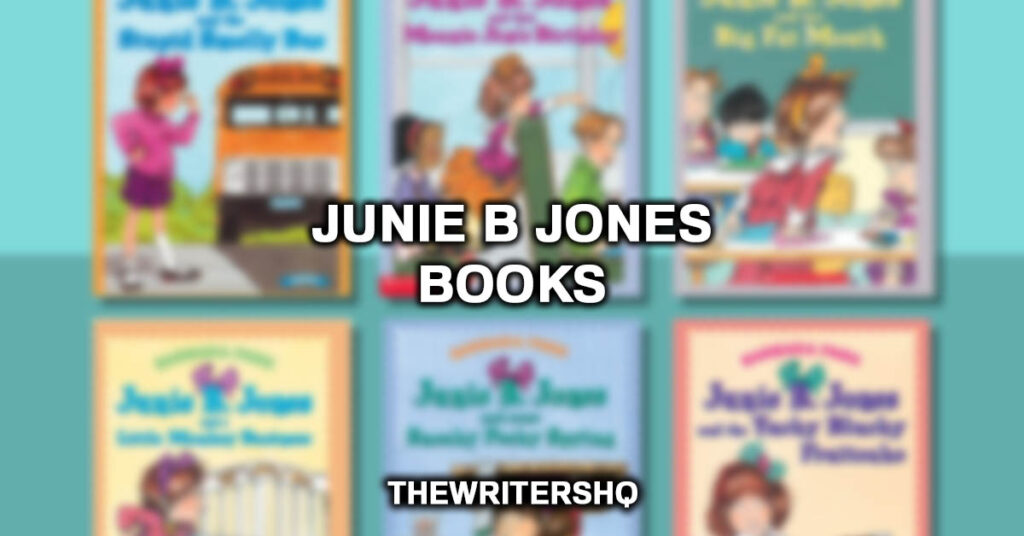
Who is Barbara Park?

Barbara Park was an esteemed American author renowned for her contribution to children’s literature. Born on April 21, 1947, in Mount Holly, New Jersey, Park started writing at an early age. She initially worked in high school textbooks before transitioning to children’s books. Her most acclaimed creation is undoubtedly the Junie B. Jones series.
Launched in 1992, the series features over 30 books. Barbara Park passed away in 2013, but her impact on children’s literature continues to be celebrated.
Do you need to read Junie B Jones’s books in order?
While each book in the Junie B. Jones series is a standalone story, reading them in order can provide a better understanding of the character’s development and experiences. The series follows Junie’s journey from kindergarten through first grade, and her personality and relationships evolve over time.
However, if a child picks up a book from the middle of the series, they will still enjoy Junie’s adventures and understand the storyline.
Junie B. Jones Books in Order
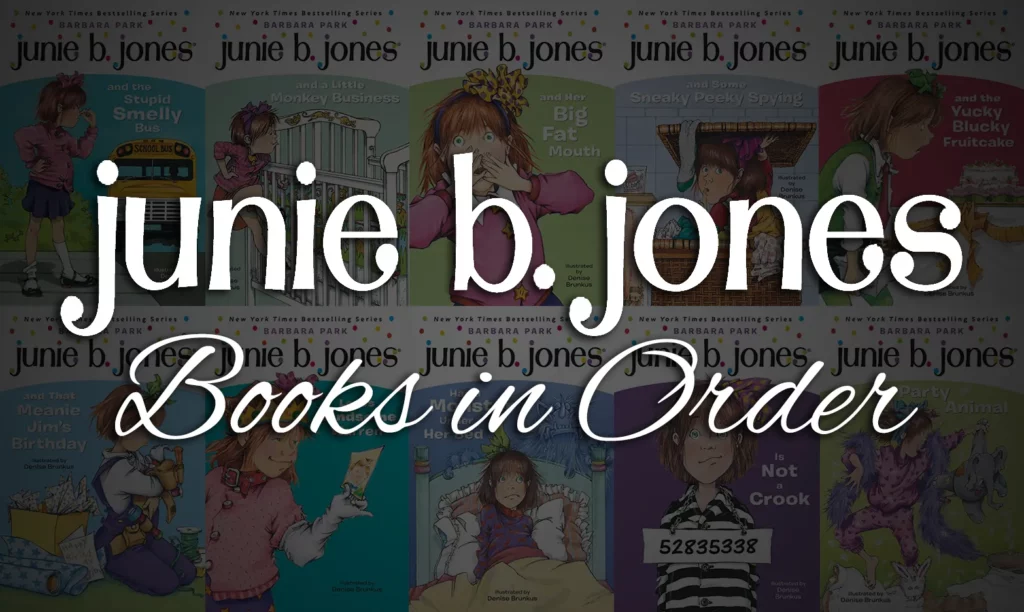
Here is a list of the Junie B. Jones books in chronological order:
- Junie B. Jones and the Stupid Smelly Bus (1992)
- Junie B. Jones and a Little Monkey Business (1993)
- Junie B. Jones and Her Big Fat Mouth (1993)
- Junie B. Jones and Some Sneaky Peeky Spying (1994)
- Junie B. Jones and the Yucky Blucky Fruitcake (1995)
- Junie B. Jones and That Meanie Jim’s Birthday (1996)
- Junie B. Jones Loves Handsome Warren (1996)
- Junie B. Jones Has a Monster Under Her Bed (1997)
- Junie B. Jones Is Not a Crook (1997)
- Junie B. Jones Is a Party Animal (1997)
(The list continues with more titles, up to the final book, “Junie B. Jones Turkeys We Have Loved and Eaten (and Other Thankful Stuff)” released in 2012)
Quick Fact: This series is a wonderful journey that showcases Junie B.’s charmingly quirky perspective on life’s ordinary and extraordinary moments. Each book serves as a delightful episode in her life, making it a beloved choice for children worldwide.
1. Junie B. Jones and the Stupid Smelly Bus (1992)

The series begins with Junie B. Jones’s first day of kindergarten. She is terrified of taking the school bus home after hearing about the dangers of the school bus from a boy. To avoid the ride, Junie B. hides in the school, leading to a big adventure and eventually getting her in trouble.
It’s a story about overcoming fear and misunderstanding, showing Junie’s resilience and sense of humor.
2. Junie B. Jones and a Little Monkey Business (1993)
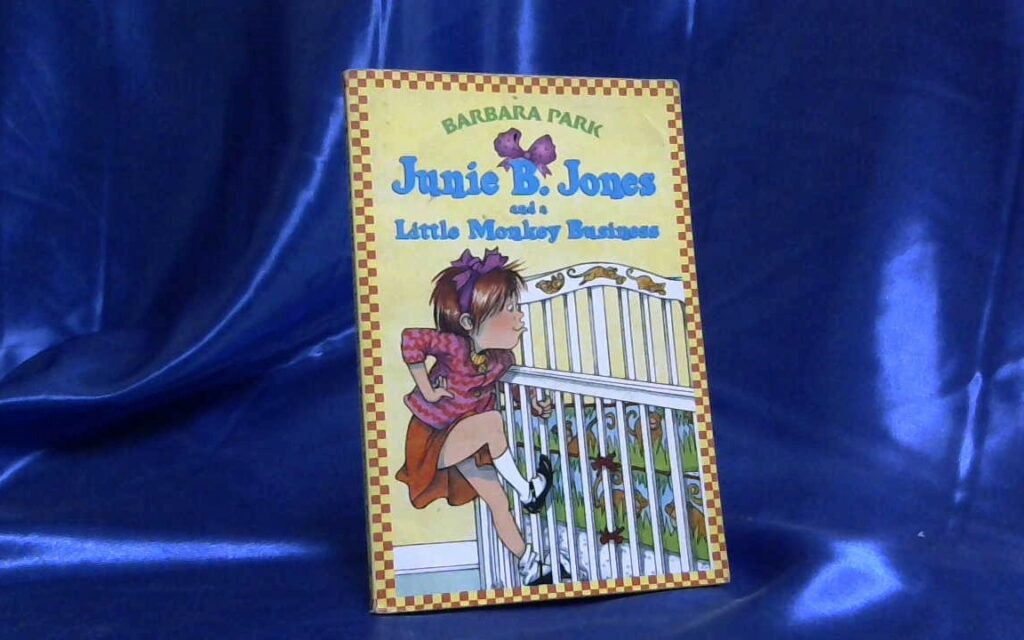
In this book, Junie B.’s life is turned upside down when her mother gives birth to a baby brother. Misunderstanding her grandmother’s statement that her new baby brother is a “little monkey,” Junie B. begins to believe her brother is an actual monkey.
She shares this misinformation at school, which leads to amusing scenarios and ultimately, a gentle lesson about truth and family.
3. Junie B. Jones and Her Big Fat Mouth (1993)
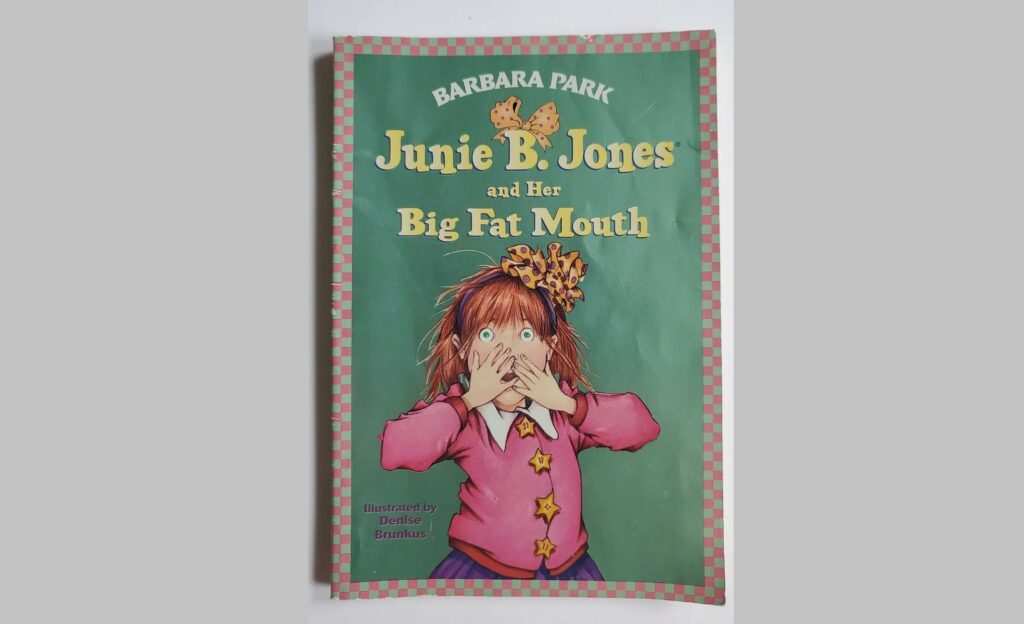
This book showcases Junie B.’s outspoken nature. She gets into trouble during Job Day when she does not like any of the jobs presented, so she creates her own job: being the boss. However, she soon learns that being a boss is not as easy as she thought, and she has to navigate her way out of this challenging situation, learning about responsibility along the way.
4. Junie B. Jones and Some Sneaky Peeky Spying (1994)

Curiosity takes center stage in this book as Junie B. Jones discovers the thrill of spying on people. She believes she’s great at it until she spies on her teacher and hears some information she shouldn’t have. This lands her in a complicated situation, and she learns a lesson about privacy and respect for others.
5. Junie B. Jones and the Yucky Blucky Fruitcake (1995)
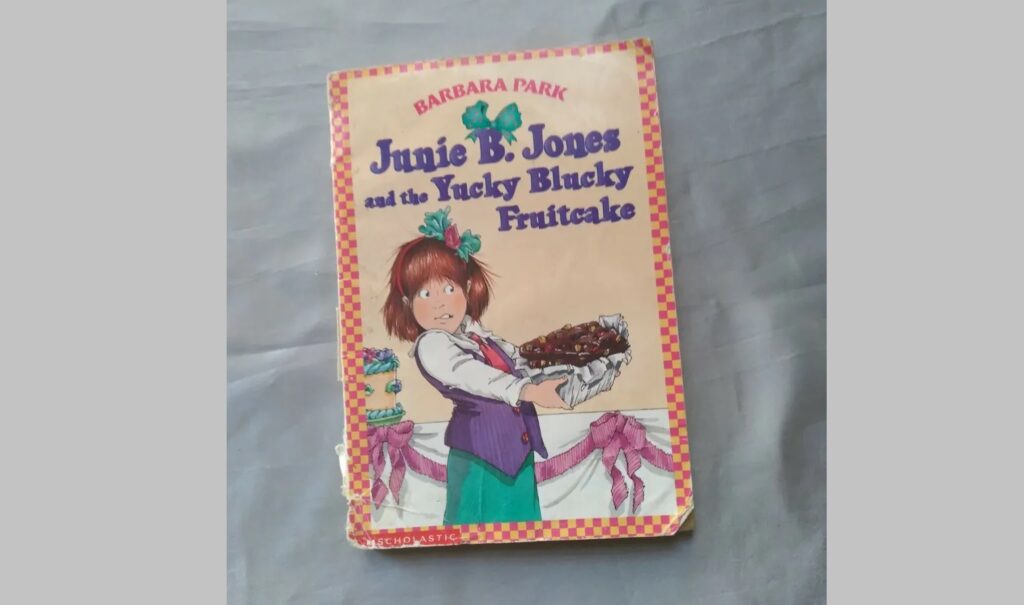
In this adventure, Junie B. Jones wins the Carnival Night Cake Walk game at school and gets to choose a cake. She picks a colorful one that turns out to be a fruitcake, which she doesn’t like. This book explores themes of expectation versus reality, disappointment, and finding humor in life’s small disappointments.
6. Junie B. Jones and That Meanie Jim’s Birthday (1996)
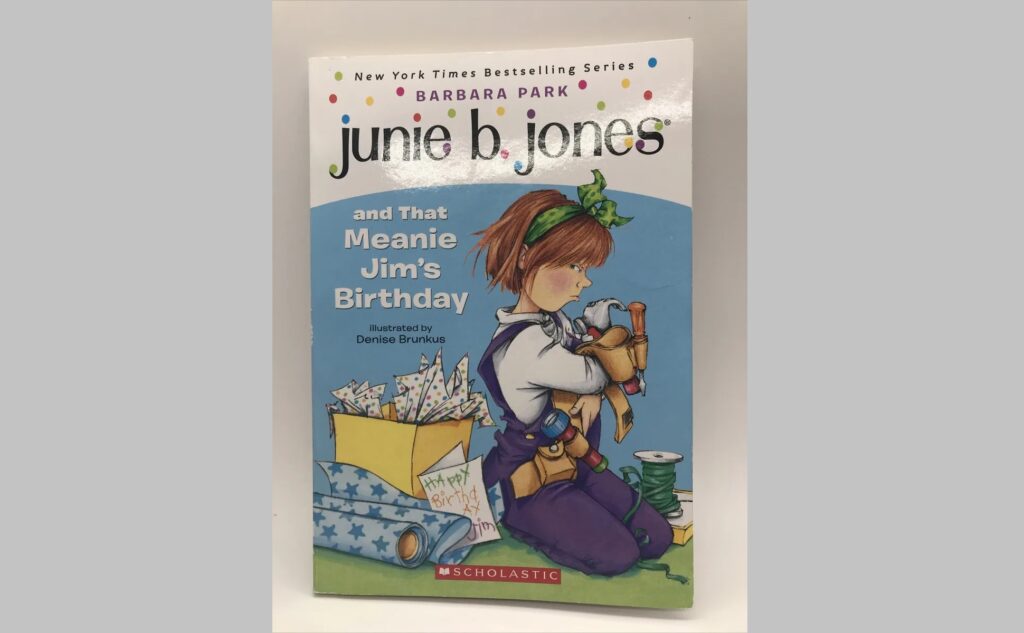
Junie B. is hurt when she finds out she’s not invited to her enemy Jim’s birthday party. She embarks on a mission to win an invitation, and when she does, she learns that things are not as rosy as she imagined. This book explores feelings of exclusion and the reality that we can’t always get what we want, teaching children how to navigate complex emotions.
7. Junie B. Jones Loves Handsome Warren (1996)
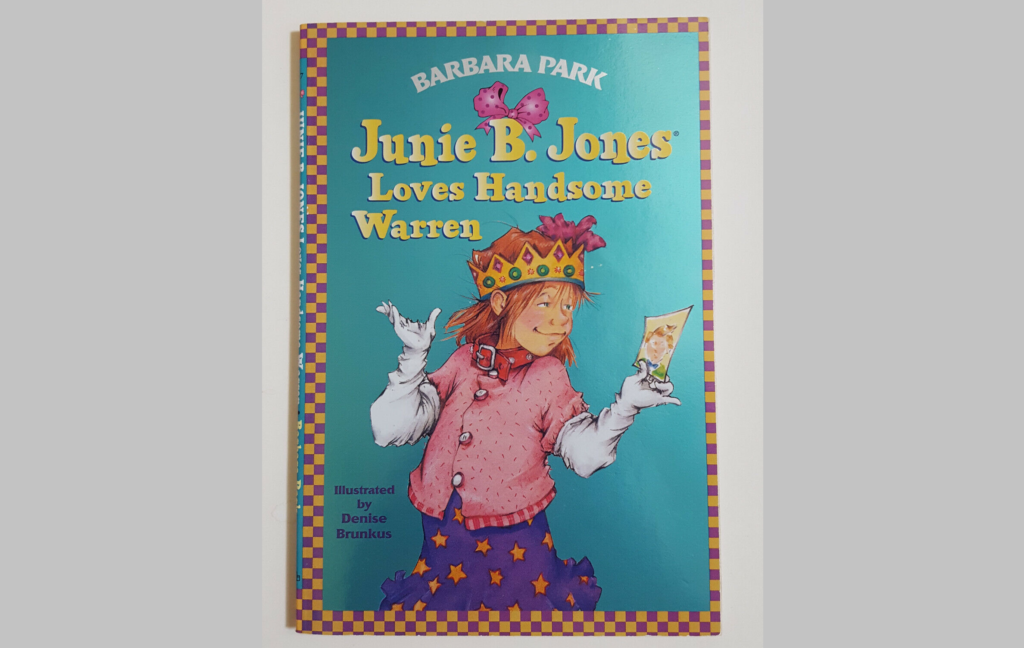
Junie B. finds herself smitten by a new classmate, Handsome Warren. However, her efforts to win his affection backfire as Warren finds her too overwhelming. The book gracefully handles young feelings of love and rejection, teaching kids that everyone is unique and that it’s okay if everyone doesn’t like us the same way.
8. Junie B. Jones Has a Monster Under Her Bed (1997)
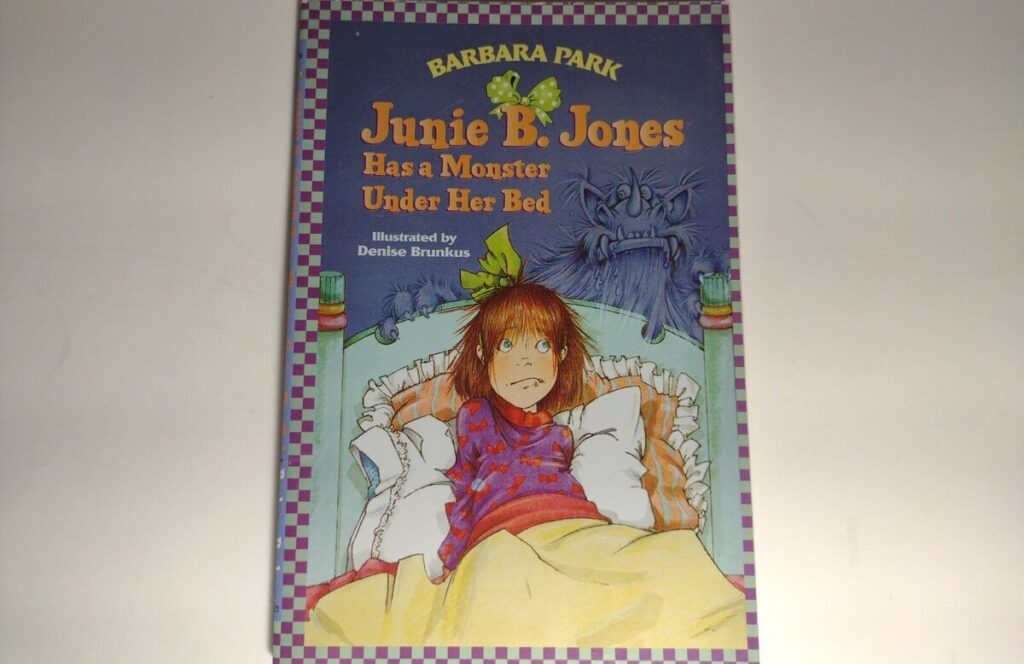
Junie B. becomes convinced there’s a monster under her bed after hearing about it from a classmate. Fear prevents her from sleeping and affects her behavior at school. The book is about facing and overcoming one’s fears, providing comfort to kids who may also have such fears.
9. Junie B. Jones Is Not a Crook (1997)
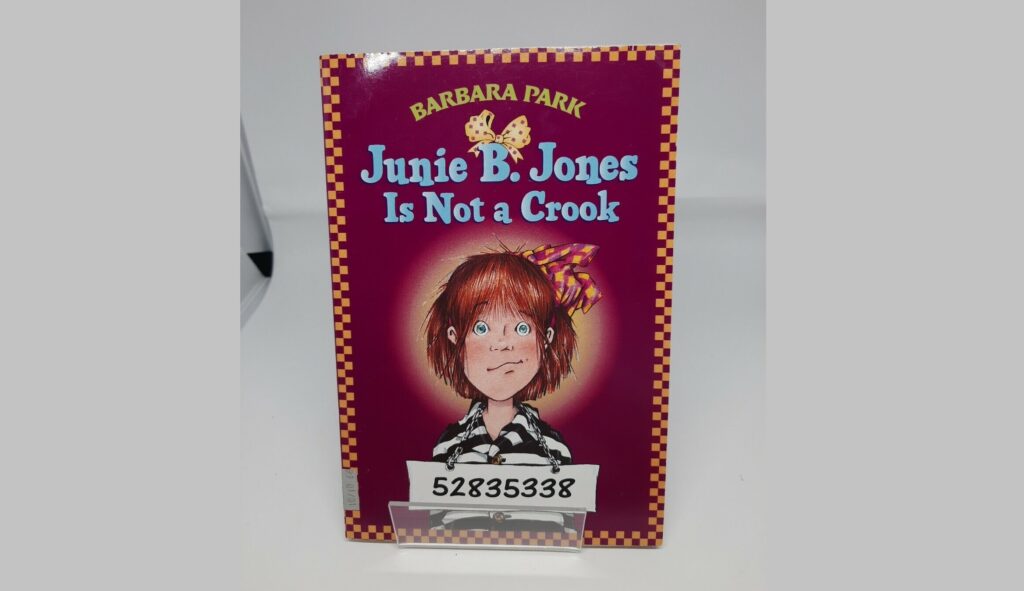
Junie B.’s new mittens are stolen when she leaves them unattended. She then finds a wonderful pen of many colors, and she keeps it, thinking finders are keepers. The storyline focuses on the concepts of right and wrong and how to navigate situations involving personal property and fairness.
10. Junie B. Jones Is a Party Animal (1997)
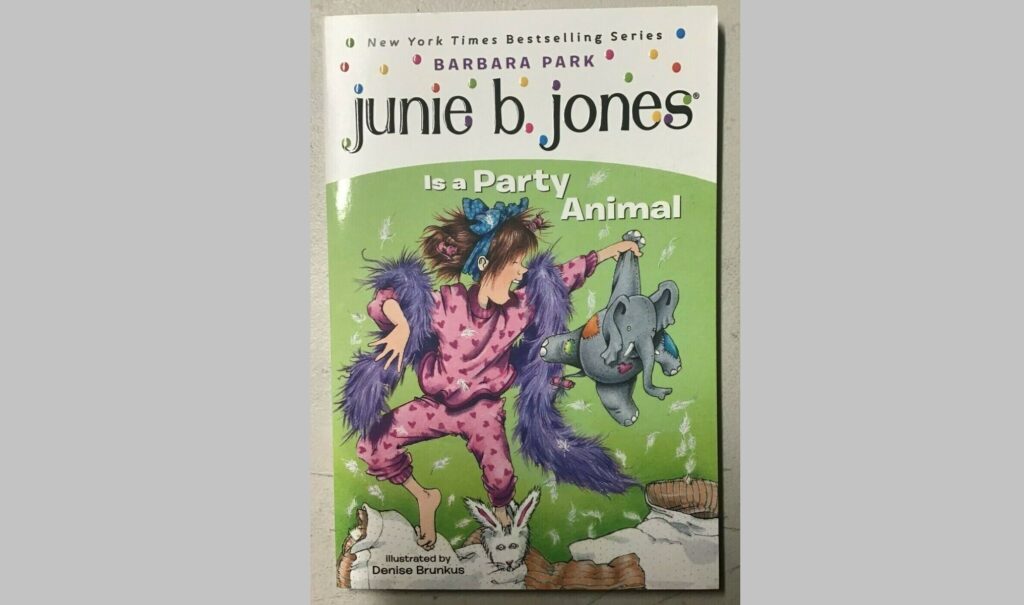
Invited to her friend Lucille’s sleepover, Junie B. is excited until she finds out she might have to sleep away from home. She must navigate her anxiety about the sleepover, demonstrating how to handle new experiences and the uncertainties they bring. The book underscores the idea that it’s okay to miss home and that it’s important to communicate our feelings.
What age is appropriate for Junie B Jones’s books?
Junie B. Jones’ books are generally appropriate for children between the ages of 6 and 9. However, the suitability can vary depending on the individual child’s reading level, comprehension skills, and emotional maturity. These books are great for independent readers, but they can also serve as an enjoyable option for adults to read aloud to younger children.
What grade level of reading is Junie B. Jones?
The Junie B. Jones series is typically suited for children in the 1st to 3rd grade, aligning with a Guided Reading Level of M and N. The language used in the books is straightforward and accessible, and the books are designed to help children improve their reading skills.
Quick Fact: The series presents age-appropriate content and tackles issues that children of this age group often encounter.
How many books are there in the Junie B Jones series?
There are a total of 28 books in the main Junie B. Jones series. The series starts with “Junie B. Jones and the Stupid Smelly Bus” and concludes with “Junie B. Jones Turkeys We Have Loved and Eaten (and Other Thankful Stuff)”.
Additionally, there are a few companion books and collections related to the series, such as “Junie B.’s Essential Survival Guide to School” and “Junie B.’s Books in a Bus”.
Do Junie B Jones’s books need to be read in order?
While it can be beneficial to read the Junie B. Jones series in order to understand Junie’s growth and development over time, it’s not necessary. Each book is a standalone story, with its own self-contained adventure or situation. If a child picks up a book from the middle of the series, they will still be able to understand and enjoy the story.
The books do, however, reference past events occasionally, which may be better understood if the books are read in sequence.
Can first graders read Junie B Jones?
Absolutely. The Junie B. Jones series is ideal for first graders. The books are designed to be engaging and entertaining for this age group, with accessible vocabulary and sentence structures that align with their reading level.
Plus, the themes and situations presented in the books often mirror those that first graders encounter in their daily lives, which can help them relate to the stories. The series also presents opportunities for discussion about character behavior, problem-solving, and empathy, which are important lessons for children of this age.
Who was Barbara Park, and how did she contribute to children’s literature?
Barbara Park was a renowned American author who significantly influenced children’s literature. Born on April 21, 1947, in Mount Holly, New Jersey, Park discovered her love for writing at a very young age. She initially worked on high school textbooks before transitioning to children’s books, finding her true calling in the latter.
Her greatest and most recognized contribution to children’s literature is the creation of the beloved character, Junie B. Jones, whose adventures she penned in a series of more than 30 books.
Starting from 1992 until her demise in 2013, Park consistently delivered engaging, humorous, and insightful stories revolving around Junie B. that have resonated with children across the globe.
Why is it beneficial to read Junie B Jones’s books in chronological order?
While each Junie B Jones’s book is a standalone story, reading them in order allows readers to follow the protagonist’s development and evolution more closely. The series portrays Junie B.’s journey from kindergarten through first grade, with her experiences, relationships, and personality evolving over time.
By reading the books in chronological order, young readers can enjoy a continuity of storyline and character development that enhances their understanding of Junie B.’s world and the situations she faces. This can add depth to their reading experience, although it’s by no means a necessity as each book provides an enjoyable read in itself.
How does the Junie B Jones series aid in developing a child’s reading skills?
The Junie B. Jones series is instrumental in developing a child’s reading skills due to its accessible language, engaging storytelling, and relatable themes. The books use age-appropriate vocabulary and sentence structures, which can help children build their reading fluency.
Quick Fact: The adventures and scenarios that Junie B. navigates are both entertaining and insightful, encouraging children to read more while also helping them understand the world around them.
Moreover, the books frequently explore emotions, relationships, and problem-solving, encouraging children to think critically and empathetically, and enhancing their comprehension skills.
Why are the Junie B Jones books a good choice for first graders?
The Junie B Jones books are an excellent choice for first graders because they align well with the reading level and life experiences of children in this age group. The language is accessible, making it easy for first graders to read independently.
The themes and situations in the books often mirror those that first graders encounter in their own lives, such as navigating school life, making friends, dealing with fears, and learning about responsibility, which helps them relate to the stories.
Furthermore, these books provide opportunities for discussion about character behavior and problem-solving, promoting critical thinking and emotional understanding, which are key developmental aspects for children in this age bracket.
What are some key themes explored in the Junie B Jones series?
The Junie B Jones series explores a wide range of themes that are relevant to children’s daily lives. These include navigating school and social scenarios, dealing with fears, facing the consequences of actions, understanding right from wrong, and experiencing feelings such as jealousy, joy, anxiety, and excitement.
The series also addresses various aspects of family life, such as welcoming a new sibling and dealing with parental rules. By presenting these themes in an engaging and humorous manner, the books help children understand and navigate their own experiences and emotions.
How do the Junie B Jones books handle complex emotions and situations?
The Junie B Jones books handle complex emotions and situations with a blend of humor, sensitivity, and realism. Whether it’s Junie B. feeling left out when not invited to a birthday party, dealing with the fear of a perceived monster under her bed, or experiencing a crush on a classmate, these situations are presented in a manner that children can relate to.
The books do not shy away from showcasing Junie B.’s missteps and the resulting consequences, thereby teaching children about accountability. The narratives also provide reassurance that it’s okay to have feelings, make mistakes, and face challenges, emphasizing that these are all part of growing up.
How do the Junie B Jones books foster a love for reading among children?
The Junie B Jones books foster a love for reading among children by offering stories that are engaging, entertaining, and relatable. The books’ lively narratives, filled with humor and authentic childlike wonder, make reading a fun and enjoyable experience.
The character of Junie B. Jones, with her unique perspective and endearing quirks, captivates young readers, making them eager to follow her adventures. The series also tackles various situations and themes that children encounter in their lives, which enhances their interest and encourages them to read more.
By presenting reading as a pleasurable activity, the Junie B Jones series helps instill a lifelong love for books in children.
Who is the primary audience of the Junie B Jones series and why?
The primary audience of the Junie B Jones series is children between the ages of 6 and 9. This age range is ideal because the content, language, and themes in the books are specifically tailored to this demographic.
The books use simple yet engaging language that aligns with the reading level of these children, allowing them to read independently while boosting their reading comprehension skills.
Moreover, the series explores scenarios and challenges that children in this age group often encounter in their daily lives, such as starting school, making friends, and navigating familial relationships, which helps them connect more deeply with the stories.
How does Barbara Park’s writing style contribute to the appeal of the Junie B Jones series?
Barbara Park’s unique writing style significantly contributes to the appeal of the Junie B Jones series. She adeptly captures the voice and perspective of a young child, allowing readers to relate to Junie B.’s experiences and feelings.
Park infuses the narrative with humor, which not only keeps young readers engaged but also allows them to approach complex emotions and situations with a light-hearted perspective. Furthermore, her straightforward and accessible language encourages children to read independently, fostering their confidence and love for reading.
What values and life lessons can children learn from the Junie B Jones series?
The Junie B. Jones series imparts a multitude of values and life lessons to children. Each book presents scenarios where Junie B. learns about responsibility, honesty, empathy, respect for others, and the importance of communication. For instance, children learn about the concept of right and wrong when Junie B. navigates situations involving personal property.
They understand the importance of honesty and truth when she deals with misunderstandings and miscommunications. Furthermore, they learn about empathy and respect for others’ feelings when Junie B. deals with friendship dynamics and family relationships.
How does the Junie B Jones series aid children in their emotional development?
The Junie B. Jones series plays a crucial role in aiding children’s emotional development. By presenting various situations and dilemmas, the books provide a safe and relatable framework for children to explore and understand their feelings.
As Junie B. navigates her world, she experiences a wide range of emotions, from joy and excitement to fear, jealousy, and disappointment. Through her experiences, children learn to identify, express, and manage their emotions, helping them understand that it’s okay to have complex feelings and that they’re not alone in experiencing them.
Why are Junie B Jones’s books an excellent resource for fostering discussions with children?
Junie B. Jones’s books serve as excellent resources for fostering discussions with children due to the multitude of themes and scenarios they cover.
Expert Tip: Parents and educators can use the situations Junie B. faces to start conversations about various topics, such as making friends, dealing with fear, facing consequences, understanding right from wrong, and managing complex feelings.
These discussions can aid children in expressing their thoughts and feelings, enhancing their comprehension and critical thinking skills, and helping them navigate their own experiences more effectively.
What makes Junie B Jones an endearing character to young readers?
Junie B. Jones is an endearing character to young readers due to her authentic and relatable portrayal. She is presented as an energetic, curious, and slightly mischievous child, traits that many children can identify with. Furthermore, she navigates a world very similar to the readers’, dealing with school, family, friends, and the ups and downs of childhood.
But what truly endears Junie B. to her readers is her unique perspective, infectious humor, and resilience, qualities that not only entertain but also inspire young readers.
How does the humor in the Junie B Jones series enhance children’s reading experience?
The humor in the Junie B. Jones series greatly enhances children’s reading experience. Barbara Park’s talent for infusing wit and childlike humor into Junie B.’s adventures makes the books entertaining and engaging, keeping young readers hooked.
The humor often comes from Junie B.’s unique take on the world, her imaginative ideas, and the amusing situations she finds herself in. This humor not only makes the stories more enjoyable but also helps children approach complex emotions and challenging situations with a light-hearted perspective, making the series a fun and enriching reading experience.
Conclusion
In conclusion, Barbara Park’s Junie B. Jones series is a cherished collection in children’s literature that has captivated young readers for decades. The series, with its humorous, relatable, and insightful narrative, not only entertains children but also aids their reading, cognitive, and emotional development.
Each adventure of Junie B. Jones is a delightful exploration of childhood, filled with valuable lessons and endless laughter, making it an enduring favorite among children, parents, and educators alike.
